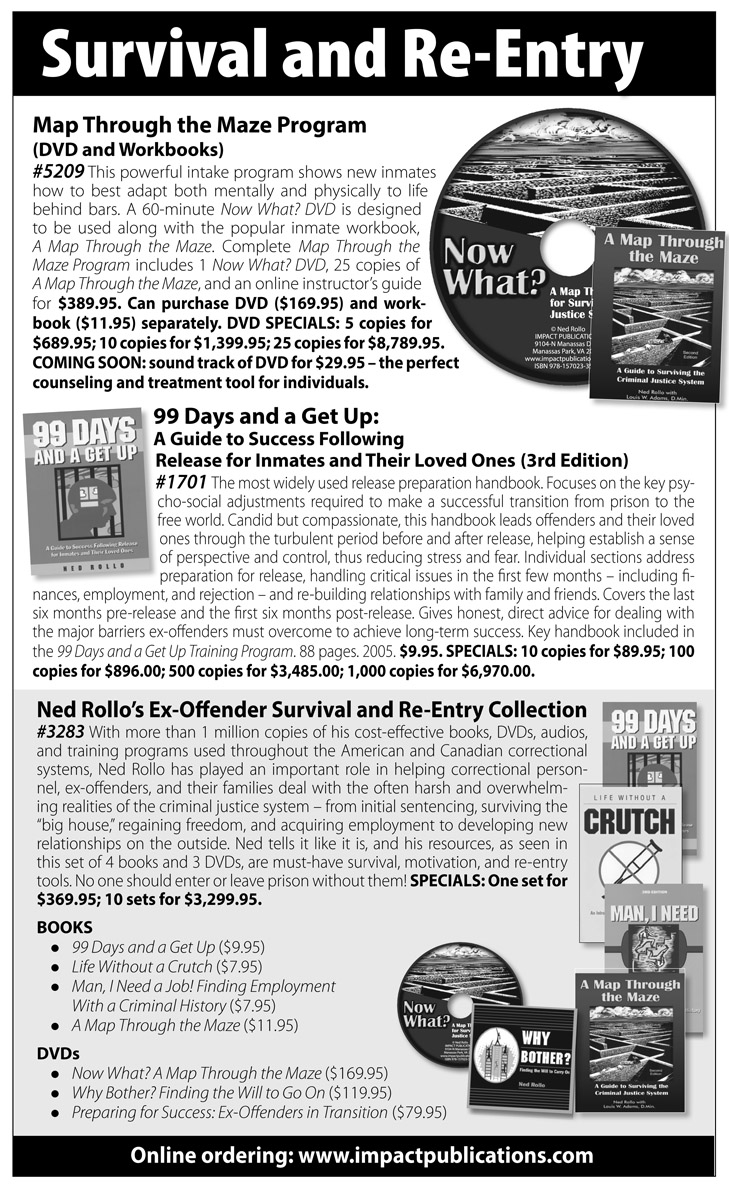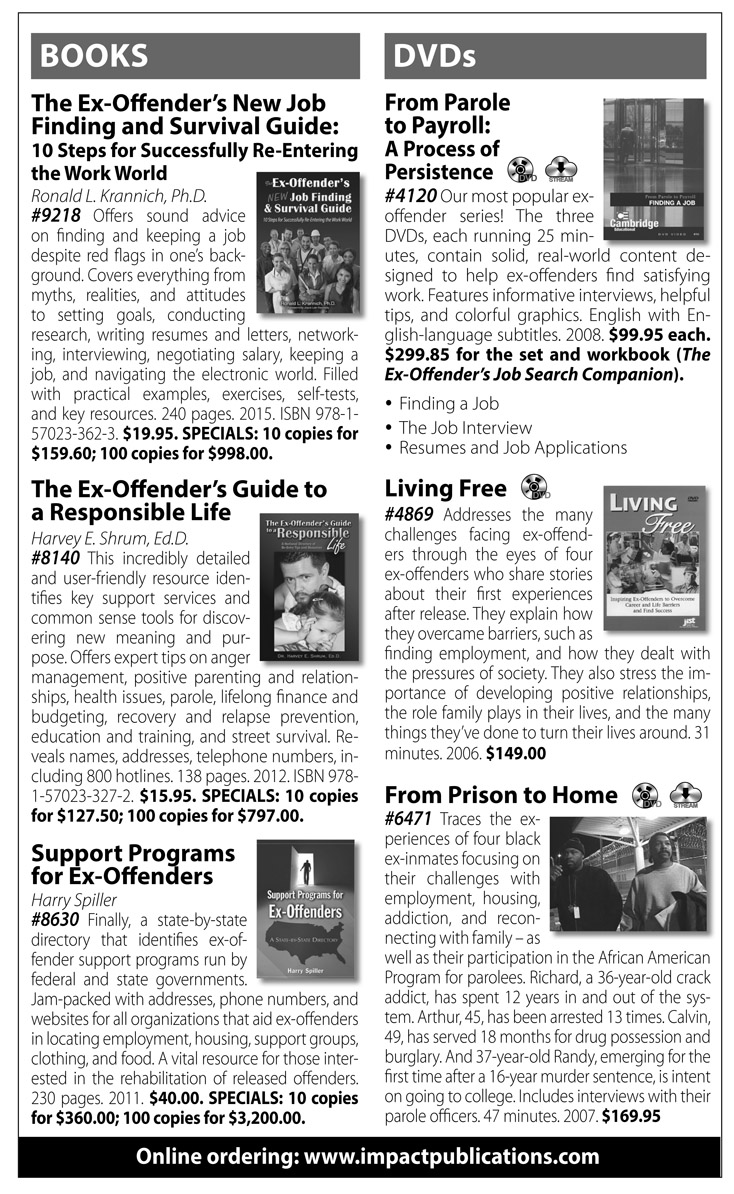Prepare for Re-Entry Success
Sometime during their incarceration many ex-offenders seem to get smart, feel the light, and swear that this time theyre going to stay out for good! Having lost many things, most importantly their freedom and key relationships, they still keep hope alive amidst some realistic fears. They have lots oftime to engage in self-reflection. Often feeling lonely, isolated, and angry, that little voice inside them keeps them company as they talk to themselves, convinced they really can make it on the outside. They try to persuade others that their current situation, based on a combination of bad luck and bad decisions, will pass as they go on to a good and productive life. At least they think such positive thoughts about changing their life. Hopes and fears become powerful motivators.
Hopes and Fears
Indeed, I frequently get letters from inmates, many of whom are repeat offenders, who basically say the same thing about their hopes and fears while locked in a cage with others of questionable character and ability to do the right thing:
I get released in six months. This time Im going to stay out for good. Believe me this is no way to live! But I need help since Im destitute and I dont know what to do, especially about housing, food, transportation, and a job. Im really scared about my future on the outside.
And they have good reasons to be scared. While they may have high hopes, what these ex-offenders most fear is simple rejection and failure, because they lack the necessary knowledge and skills for success. They are afraid they may not make it very long on the outside. They know from experience, as well as from stories of others, that its a tough road to travel wheh you initially enter a fast-moving free world with nothing more than the clothes on your back, maybe $100 in gate money, and good intentions truly a sink-or-swim situation. What they need is wisdom, determination, and a few good friends with helping hands to assist them through the re-entry process.
You need wisdom, determination, and a few good friends to help you through the re-entry process.
Getting Up, Moving On
Welcome to the well-worn road of good intentions and hopeful change based on sheer willpower. Often casting aside the dual demons of addiction and anger, many ex-offenders experience a major revelation, or epiphany, about what they want to do with the rest of their lives. Indeed, they finally realize that life is too short to throw it away behind bars with others who seem to be going nowhere. Its time to pick yourself up, dust yourself off, develop more productive and functional relationships, and get on with building a good life you were meant to live. Indeed, its time that you take some important life-changing actions!
Self-Transformation Through Implementation
Yes, thats what seeing the light is all about staying out for good by making smart decisions that lead to becoming a good and productive father, mother, son, daughter, friend, employee, neighbor, and taxpayer. It means abandoning old habits, patterns, and relationships that got you where you are at present. It requires developing new attitudes, habits, and relationships for success that need to be initially repeated day in and day out over those first critical 99 days for achieving permanent freedom.
Implementation involves translating goals into specific actions that produce results.
But self-transformation is not easy to do on your own. Life on the outside can be scary, filled with seemingly insurmountable barriers to success. And it can be expensive, especially for those who are destitute or who have very limited income and who have little experience in handling personal finances involving bank accounts, credit cards, insurance, borrowing, investment, and paying bills. You need some help along the way, such as a mentor and a good planning and implementation book, that keeps you focused on finding the right path ahead. It requires motivation and hard work focused on a positive attitude, clear goals, and specific actions that lead to accomplishing those goals. It requires implementation, the process of translating goals into specific actions that produce desired results or outcomes.
Heres the basic re-entry success formula underlying everything appearing in this weekly planning and implementation journal:
Implementation
Despite good intentions, somewhere along the way to permanent freedom many ex-offenders stumble and fall. Not surprisingly, many have difficulty getting up and running in the right direction on their own. They quickly find that life on the outside can even be harder than life on the inside, especially when it comes to such basics as food and shelter. Lacking key life skills from renting an apartment and paying bills to buying a car, supporting a family, and parenting many ex-offenders make poor decisions, similar to ones that got them where they just came from.
Worst of all, few ex-offenders take responsibility for their actions. Instead, they blame their situation or circumstances on some mysterious force or hidden hand beyond their control. They simply dont get what this is all about taking purposeful actions that lead to desired results. They fail to understand the importance of implementation!
Perhaps they blame it on the lack of daily necessities, such as permanent and affordable housing, food, and clothing. They start out destitute, not knowing how to survive with little or no money in their pockets. Lacking a bigger picture, they soon become bottom-feeders always looking for free stuff, entitlements, and assistance who never get their heads above water.
Maybe they blame their lack of success on others no one wants to hire them, people dont want to rent to or live next to an ex-offender, no one wants to extend credit or a helping hand to an ex-offender, or someone took advantage of them.
Many ex-offenders thus increasingly gravitate to the world of helping hands non profits, charitable organizations, and faith-based groups.
They quickly become unbanked and financially unstable people, living from occasional paycheck to paycheck, with no savings for a rainy day. They experience a debilitating web of financial difficulties dont pay bills on time, experience credit problems, take out high-interest payday loans, use expensive check-cashing services, kite checks, overdraft accounts, get evicted, and/or become bankrupt. In the end, the road to freedom is littered with lots of financial potholes that affect many other aspects of their lives. Before long they begin realizing their greatest fears not being able to stay out for good! One bad decision leads to another bad decision and, before long, life gets very complicated, messy, and even traumatic. Even relationships with family and friends may deteriorate to the point where no one wants to help them or even be around them. Needless to say, their future doesnt look very promising. In fact, many ex-offenders follow the same old dysfunctional patterns that previously got them into the jaws of the criminal justice system.











